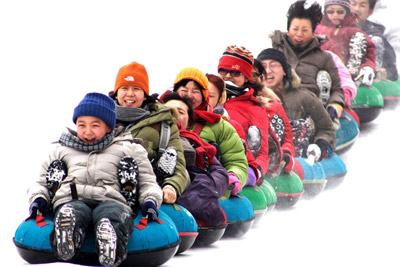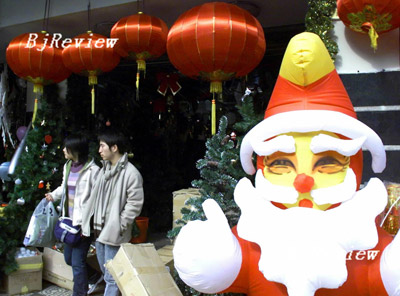|

White Winter Signals Happy New Year
Sliding into the New Year is cool fun for these adrenaline junkies at a ski resort in Jilin City, northeast China's Jilin Province on January 1. Large snowfalls, believed to be a blessing at this time of year by most Chinese, occurred across north China to herald 2007.
Will Fuel Price Hikes Reduce Private Cars?
 Increasing numbers of private cars are making the traffic situation in Beijing unbearable. Some experts propose that apart from great efforts to develop the public transit system, another way to curb the number of private cars is to raise fuel prices and relevant fees charged on these cars. Is it really workable? In recent years, fuel prices have risen from 2 yuan per liter to over 4 yuan per liter, but the reality is that instead of decreasing, the number of private cars is growing in tandem with the booming economy. Increasing numbers of private cars are making the traffic situation in Beijing unbearable. Some experts propose that apart from great efforts to develop the public transit system, another way to curb the number of private cars is to raise fuel prices and relevant fees charged on these cars. Is it really workable? In recent years, fuel prices have risen from 2 yuan per liter to over 4 yuan per liter, but the reality is that instead of decreasing, the number of private cars is growing in tandem with the booming economy.
One result is certain: If the fuel price is raised, people will have to pay more for transportation, either in terms of freight or passenger service. More importantly, profits from fuel prices and higher fares are never returned to the public in other forms, but are transferred to assets of some monopoly industries or departments. Similarly, to limit private cars by raising fuel prices is also an example of increasing the minority's interests at the cost of the majority.
It seems that when trying to solve problems, the government is content to turn to price hikes for help. When railway stations are overflowing, train tickets will see a price rise; when scenic spots are filled with tourists, admission tickets will suddenly become more expensive. Ostensibly, price hikes act as a lever to regulate the economy, but actually all it does is to place additional pressure on an already suffering public.
China Youth Daily
Killing Pedestrians to Save Money?
There have been recent reports about vehicle drivers deliberately killing people they have injured in accidents, in order to avoid paying a perceived never-ending list of medical fees. In contrast, compensation for a death is a limited amount, and in most cases, those at fault can get insurance indemnity if the victim is dead.
Torn between morality and personal interests, ordinary people are becoming criminals. However, we must pay attention to an embarrassing fact: In accordance with the current law, if the victim is seriously hurt or disabled because of a traffic accident, the driver will face a mountain of trouble, including infinite medical bills, while if the victim dies in the accident, the driver only needs to pay compensation of up to 400,000 yuan. Bearing the two options in mind, some drivers opt for murder.
Generally speaking, death should bring drivers the most severe punishment, but it's a pity, to some extent, that the law is enticing people to commit murder. If there is no rigorous punishment, but only a higher compensation for the death of victims, we are surely to see more tragedies caused by holes in the legal system.
Yangcheng Evening News
How to Revive Traditional Festivals?
While Western festivals, including Christmas, Saint Valentine's Day, April Fool's Day, become increasingly popular in China, such Chinese traditional celebrations as Spring Festival, Mid-Autumn Festival and Dragon Boat Festival, are losing their attraction. Because of this, some people suggest that actions should be taken to safeguard traditional festivals and culture by making them public holidays.
Are public holidays the key for the popularity of festivals? Without holidays, some Western festivals are still attractive to many people, especially the young. On Christmas Eve, despite not getting days off, recreational venues are still jam-packed with excited young people, celebrating the festival whose origins they have no connection with.
We should pay more attention to cultural attractions of local festivals. Without promoting the youth's passion for traditional culture, no matter how long the holidays are, we cannot expect a revival of these celebrations. Originally, traditional Chinese festivals are accompanied by various interesting ceremonies and customs, but nowadays they are deteriorating into "days for eating and shopping."
To revitalize China's traditional festivals and culture requires efforts by the whole of society, including education on traditional and local culture to children. The government, businesses and the media should all try to update and enrich traditional festivals, rather than expecting longer holidays to revitalize them.
Guangzhou Daily
Government Should Buy Local Goods
It often happens in China that while government energetically encourages the use of local brands, in reality it seldom puts domestic products on the list of government procurement. But if we are stingy in giving tangible support, local brands will forever live in the shadow of foreign products.
Besides, except for their reputation, some Chinese brands are actually as good as their foreign counterparts, and even better in some cases.
What government's procurement of domestic products will do is to influence the public in deciding what to buy, as the latter tend to believe what the authorities choose is always the best quality. In this case, if the government buys local, it will actually be promoting these brands at the same time.
Despite their rapid progress, most of China's local businesses are not even familiar with the domestic market. Lacking advertising capital, they badly need the government's support to increase sales. The government should be giving local products preference when they make purchases.
China Youth Daily
| 